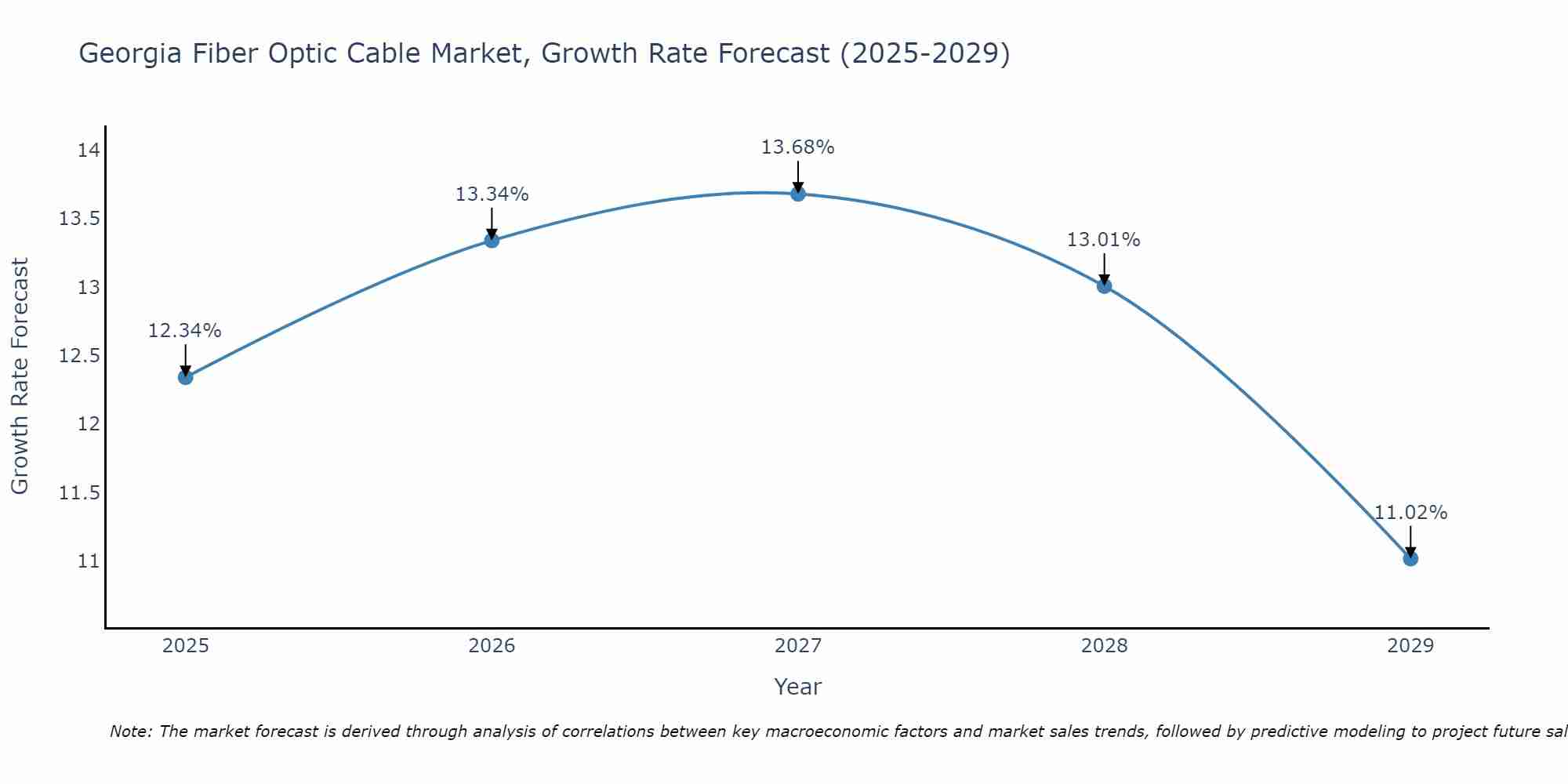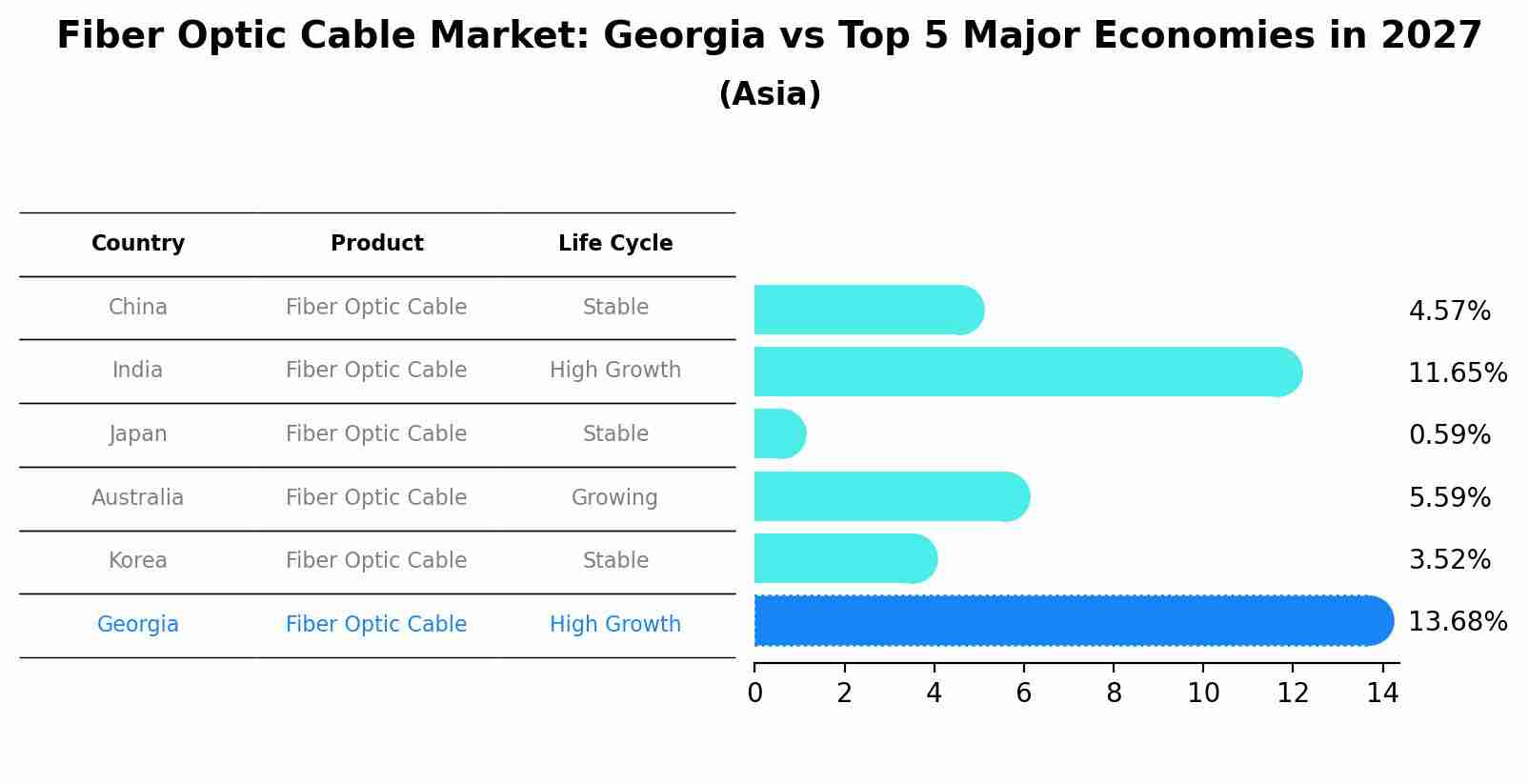Georgia Fiber Optic Cable Market Outlook | COVID-19 IMPACT, Value, Forecast, Size, Industry, Revenue, Companies, Growth, Share, Analysis & Trends
| Product Code: ETC364020 | Publication Date: Aug 2022 | Updated Date: Aug 2025 | Product Type: Market Research Report | |
| Publisher: 6Wresearch | Author: Shubham Padhi | No. of Pages: 75 | No. of Figures: 35 | No. of Tables: 20 |
Georgia Fiber Optic Cable Market Size Growth Rate
The Georgia Fiber Optic Cable Market is projected to witness mixed growth rate patterns during 2025 to 2029. Starting at 12.34% in 2025, the market peaks at 13.68% in 2027, and settles at 11.02% by 2029.

Fiber Optic Cable Market: Georgia vs Top 5 Major Economies in 2027 (Asia)
By 2027, Georgia's Fiber Optic Cable market is forecasted to achieve a high growth rate of 13.68%, with China leading the Asia region, followed by India, Japan, Australia and South Korea.

Georgia Fiber Optic Cable Market Synopsis
The Georgia Fiber Optic Cable Market is experiencing significant growth driven by increasing demand for high-speed internet connectivity across residential, commercial, and industrial sectors. With the expansion of telecommunications infrastructure and the growing adoption of advanced technologies like 5G, cloud computing, and IoT, there is a rising need for reliable and high-capacity fiber optic networks in the state. Key market players in Georgia, such as AT&T, Comcast, and Windstream, are investing heavily in expanding their fiber optic networks to meet the escalating demand for bandwidth-intensive applications. The deployment of fiber optic cables is also being accelerated by government initiatives aimed at improving broadband access in rural areas. Overall, the Georgia Fiber Optic Cable Market is poised for continued growth as the state transitions towards a more digitally connected economy.
Georgia Fiber Optic Cable Market Trends
The Georgia Fiber Optic Cable Market is witnessing significant growth driven by the increasing demand for high-speed internet connectivity, especially in urban areas and commercial spaces. The deployment of fiber optic cables for applications such as telecommunication networks, data centers, and smart infrastructure projects is on the rise. Additionally, the growing adoption of fiber-to-the-home (FTTH) technology for residential broadband services is fueling market expansion. Telecom operators and internet service providers are investing in expanding their fiber optic networks to meet the escalating bandwidth requirements of consumers and businesses. Moreover, advancements in fiber optic technology, such as higher data transmission speeds and improved reliability, are further propelling the market forward. Overall, the Georgia Fiber Optic Cable Market is poised for continued growth in the coming years as the need for faster and more reliable internet connectivity increases.
Georgia Fiber Optic Cable Market Challenges
The Georgia Fiber Optic Cable Market faces several challenges, including increasing competition among providers leading to pricing pressures, the need for continuous investment in infrastructure to keep up with evolving technology and consumer demands, and potential regulatory hurdles that may impact expansion efforts. Additionally, the market may also have to address issues related to the geographical spread of customers, as rural areas may not be as well served compared to urban centers. Ensuring reliable and high-speed connectivity in all regions of Georgia while balancing cost-effectiveness and quality of service will be crucial for companies operating in the fiber optic cable market in the state.
Georgia Fiber Optic Cable Market Investment Opportunities
The Georgia Fiber Optic Cable Market presents promising investment opportunities due to increasing demand for high-speed internet connectivity, data transmission, and digitalization across various industries. Investing in fiber optic cable infrastructure development companies or telecommunication service providers in Georgia can offer substantial returns. The state`s growing economy, government initiatives to expand broadband access, and the presence of key industries such as technology, healthcare, and education create a favorable environment for fiber optic cable investments. Additionally, the potential for future growth in smart city projects, 5G network expansion, and Internet of Things (IoT) applications further enhances the attractiveness of investing in the Georgia Fiber Optic Cable Market. Conducting thorough market research and analysis, understanding regulatory frameworks, and identifying key players are essential steps to capitalize on these investment opportunities.
Jordan Agar Market Government Policies
The government of Georgia has implemented several policies to support the growth of the fiber optic cable market in the state. These policies include providing tax incentives and subsidies to companies investing in fiber optic infrastructure, streamlining the permitting process for laying fiber optic cables, and promoting public-private partnerships to expand broadband access in underserved areas. Additionally, the government has allocated funds for research and development in fiber optic technology to drive innovation and competitiveness in the market. Overall, these policies aim to foster a conducive environment for the expansion of the fiber optic cable market in Georgia, ensuring reliable and high-speed internet connectivity for residents and businesses across the state.
Georgia Fiber Optic Cable Market Future Outlook
The future outlook for the Georgia Fiber Optic Cable Market appears promising, with continued growth anticipated in the coming years. Factors such as increasing demand for high-speed internet connectivity, advancements in technology that require reliable and fast data transmission, and the expansion of digital infrastructure across industries are expected to drive the market. The deployment of 5G networks, smart city initiatives, and the growing adoption of Internet of Things (IoT) devices are also likely to fuel the demand for fiber optic cables in Georgia. Additionally, government investments in broadband infrastructure and the push towards digitalization are further contributing to the positive outlook for the market. Overall, the Georgia Fiber Optic Cable Market is poised for expansion and innovation as the state progresses towards a more connected and digitally advanced future.
Key Highlights of the Report:
- Georgia Fiber Optic Cable Market Outlook
- Market Size of Georgia Fiber Optic Cable Market, 2021
- Forecast of Georgia Fiber Optic Cable Market, 2031
- Historical Data and Forecast of Georgia Fiber Optic Cable Revenues & Volume for the Period 2018 - 2031
- Georgia Fiber Optic Cable Market Trend Evolution
- Georgia Fiber Optic Cable Market Drivers and Challenges
- Georgia Fiber Optic Cable Price Trends
- Georgia Fiber Optic Cable Porter's Five Forces
- Georgia Fiber Optic Cable Industry Life Cycle
- Historical Data and Forecast of Georgia Fiber Optic Cable Market Revenues & Volume By Cable Type for the Period 2018 - 2031
- Historical Data and Forecast of Georgia Fiber Optic Cable Market Revenues & Volume By Single-Mode for the Period 2018 - 2031
- Historical Data and Forecast of Georgia Fiber Optic Cable Market Revenues & Volume By Multi-Mode for the Period 2018 - 2031
- Historical Data and Forecast of Georgia Fiber Optic Cable Market Revenues & Volume By Material for the Period 2018 - 2031
- Historical Data and Forecast of Georgia Fiber Optic Cable Market Revenues & Volume By Glass for the Period 2018 - 2031
- Historical Data and Forecast of Georgia Fiber Optic Cable Market Revenues & Volume By Plastic for the Period 2018 - 2031
- Historical Data and Forecast of Georgia Fiber Optic Cable Market Revenues & Volume By Application for the Period 2018 - 2031
- Historical Data and Forecast of Georgia Fiber Optic Cable Market Revenues & Volume By Communication for the Period 2018 - 2031
- Historical Data and Forecast of Georgia Fiber Optic Cable Market Revenues & Volume By Power Transmission for the Period 2018 - 2031
- Historical Data and Forecast of Georgia Fiber Optic Cable Market Revenues & Volume By Sensor for the Period 2018 - 2031
- Historical Data and Forecast of Georgia Fiber Optic Cable Market Revenues & Volume By Others for the Period 2018 - 2031
- Georgia Fiber Optic Cable Import Export Trade Statistics
- Market Opportunity Assessment By Cable Type
- Market Opportunity Assessment By Material
- Market Opportunity Assessment By Application
- Georgia Fiber Optic Cable Top Companies Market Share
- Georgia Fiber Optic Cable Competitive Benchmarking By Technical and Operational Parameters
- Georgia Fiber Optic Cable Company Profiles
- Georgia Fiber Optic Cable Key Strategic Recommendations
Frequently Asked Questions About the Market Study (FAQs):
- Single User License$ 1,995
- Department License$ 2,400
- Site License$ 3,120
- Global License$ 3,795
Search
Thought Leadership and Analyst Meet
Our Clients
Related Reports
- Germany Breakfast Food Market (2026-2032) | Industry, Share, Growth, Size, Companies, Value, Analysis, Revenue, Trends, Forecast & Outlook
- Australia Briquette Market (2025-2031) | Growth, Size, Revenue, Forecast, Analysis, Trends, Value, Share, Industry & Companies
- Vietnam System Integrator Market (2025-2031) | Size, Companies, Analysis, Industry, Value, Forecast, Growth, Trends, Revenue & Share
- ASEAN and Thailand Brain Health Supplements Market (2025-2031) | Strategy, Consumer Insights, Analysis, Investment Trends, Opportunities, Growth, Size, Share, Industry, Revenue, Segments, Value, Segmentation, Supply, Forecast, Restraints, Outlook, Competition, Drivers, Trends, Demand, Pricing Analysis, Competitive, Strategic Insights, Companies, Challenges
- ASEAN Bearings Market (2025-2031) | Strategy, Consumer Insights, Analysis, Investment Trends, Opportunities, Growth, Size, Share, Industry, Revenue, Segments, Value, Segmentation, Supply, Forecast, Restraints, Outlook, Competition, Drivers, Trends, Demand, Pricing Analysis, Competitive, Strategic Insights, Companies, Challenges
- Europe Flooring Market (2025-2031) | Outlook, Share, Industry, Trends, Forecast, Companies, Revenue, Size, Analysis, Growth & Value
- Saudi Arabia Manlift Market (2025-2031) | Outlook, Size, Growth, Trends, Companies, Industry, Revenue, Value, Share, Forecast & Analysis
- Uganda Excavator, Crane, and Wheel Loaders Market (2025-2031) | Strategy, Consumer Insights, Analysis, Investment Trends, Opportunities, Growth, Size, Share, Industry, Revenue, Segments, Value, Segmentation, Supply, Forecast, Restraints, Outlook, Competition, Drivers, Trends, Demand, Pricing Analysis, Competitive, Strategic Insights, Companies, Challenges
- Rwanda Excavator, Crane, and Wheel Loaders Market (2025-2031) | Strategy, Consumer Insights, Analysis, Investment Trends, Opportunities, Growth, Size, Share, Industry, Revenue, Segments, Value, Segmentation, Supply, Forecast, Restraints, Outlook, Competition, Drivers, Trends, Demand, Pricing Analysis, Competitive, Strategic Insights, Companies, Challenges
- Kenya Excavator, Crane, and Wheel Loaders Market (2025-2031) | Strategy, Consumer Insights, Analysis, Investment Trends, Opportunities, Growth, Size, Share, Industry, Revenue, Segments, Value, Segmentation, Supply, Forecast, Restraints, Outlook, Competition, Drivers, Trends, Demand, Pricing Analysis, Competitive, Strategic Insights, Companies, Challenges
Industry Events and Analyst Meet
Whitepaper
- Middle East & Africa Commercial Security Market Click here to view more.
- Middle East & Africa Fire Safety Systems & Equipment Market Click here to view more.
- GCC Drone Market Click here to view more.
- Middle East Lighting Fixture Market Click here to view more.
- GCC Physical & Perimeter Security Market Click here to view more.
6WResearch In News
- Doha a strategic location for EV manufacturing hub: IPA Qatar
- Demand for luxury TVs surging in the GCC, says Samsung
- Empowering Growth: The Thriving Journey of Bangladesh’s Cable Industry
- Demand for luxury TVs surging in the GCC, says Samsung
- Video call with a traditional healer? Once unthinkable, it’s now common in South Africa
- Intelligent Buildings To Smooth GCC’s Path To Net Zero


















